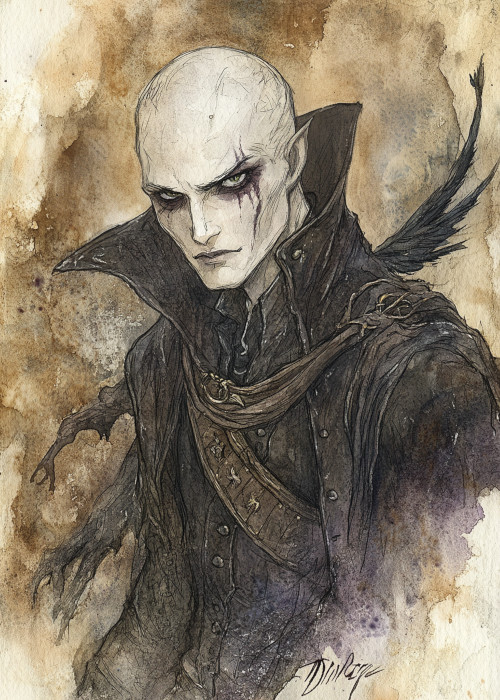Marlow Clyst
Marlow Clyst is a half-elven playwright whose words cut deeper than daggers and linger longer than curses. Born to a seamstress and a merchant lord’s son, Marlow grew up between two worlds—among silks and shadows, privilege and poverty. With a quick wit and a sharper tongue, he rose through the city’s playhouses as a promising dramatist known for barbed social satires and layered allegories. But Marlow’s pen did more than entertain—it exposed, and his greatest work nearly got him killed.
His infamous play, The Thorn Beneath the Laurel, was a masterwork of theatrical craft and dangerous truth. Ostensibly a tale of a noble’s rise and slow undoing, it was in fact a thinly veiled allegory for Duke Calder Thorne, whose literal infernal pact was known only to a handful of confidants. But by the second act, whispers spread through the audience like fire through dry parchment: Marlow had named the Devil, and the devil was seated in the lord’s box. When the curtain fell, it was not applause that followed, but arrest warrants. Charged with sedition and treason, sentenced to hang, Marlow fled under cover of night, his theatre burned and his actors scattered.
Rather than vanish, Marlow became a ghost of ink and parchment. He turned his talents to underground broadsheets and subversive chapbooks, distributing plays, essays, and whispered truths beneath aliases. Each pamphlet appeared in the night like seeds of dissent—revealing pacts made, heirs poisoned, taxes rigged, and gods betrayed. He knew which secrets to speak and which to keep, weaving just enough truth to make his audience doubt everything. In time, someone—something—began protecting him.
That something was the Court of Long Shadows. Drawn by his skill at manipulating truth through narrative, by his refusal to be silenced, and by his uncanny ability to vanish whenever pursuers closed in, they offered him shelter. Now he writes by candlelight in fey-touched corners, cloaked in illusion, whispering truths into the ears of rebels and romantics alike. His words are still dangerous. His plays are still performed—illegally, fervently, defiantly.
To the nobles he exposes, Marlow Clyst is a traitor with a silver tongue. To the common folk, he is a folk hero of ink and theater. To the Court of Long Shadows, he is a shadowwalker with a playwright’s grace—a man who understands that the greatest weapon is a story that refuses to die.

Current Location
Species
Ethnicity
Other Ethnicities/Cultures
Children
Pronouns
They/Them
Gender
Masculine
Presentation
Male
Eyes
Gray
Hair
Completely hairless
Skin Tone/Pigmentation
Pale white
Aligned Organization
Other Affiliations

